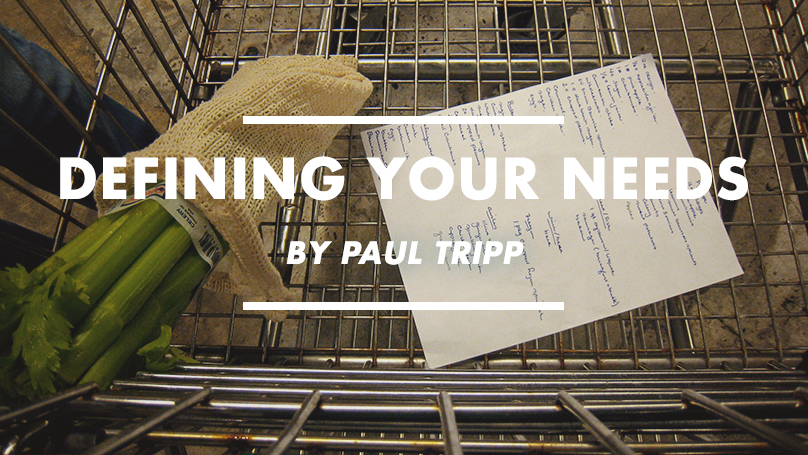I’ve been spending some time reflecting on Jesus’ teaching from Matthew 6. I’ve laid out 3 Treasure Principles; I’ve explained the Exclusivity of Treasure Pursuit; and I’ve discussed some applications of Earth-Bound Parenting. Today I want to talk about the word “need” found in verse 32.
“Therefore do not be anxious, saying, ‘What shall we eat?’ or ‘What shall we drink?’ or ‘What shall we wear?’ For the Gentiles seek after all these things, and your heavenly Father knows that you need them all.” (Matthew 6:31-32, ESV, emphasis mine)
Defining Need
I would argue that Jesus is teaching that we’re not responsible for defining our own needs. Now, let’s be honest – this doesn’t make sense to us.Think about it. Would you ever let a stranger go to the supermarket and purchase your groceries; let a relative select your outfit for the day; let a colleague plan your family vacation?
Of course not: “They don’t know what I need to eat or what I need to wear or what I need to enjoy my vacation.”Here’s an important principle to remember: you and I struggle to give up control because we think no one else knows what we need more than we do.
Listening to the surrounding culture doesn’t help, either. Everywhere you turn you’ll find propaganda urging you to “chase after your dream” or “do what you want” or “don’t let anyone tell you no.”
You’re constantly bombarded with the ideology that no one knows you better than you know you.Jesus counters this worldly ideology with heavenly theology: only God knows what you truly need.
You and I struggle to give up control because we think no one else knows what we need more than we do…only God knows what you truly need.
Existence-based Needs
Now, I need to include a quick disclaimer. I’m not talking about the daily physical needs that are essential for human existence, like eating, drinking, sleeping, and adjusting your wardrobe to the climate so you don’t overheat or freeze to death.
Those are “existence-based” needs, and God has made you a steward over your body (Romans 12:1 and 1 Corinthians 6:15), so it’s biblical that you take responsibility for them.I’m talking about things – they can be physical, emotional and/or spiritual – that you tell yourself you “need” to be happy.
This could be anything: increased income, a safer neighborhood, a more respectful spouse or child, a church that loves your ministry, and so on. You fill in the blank: “If only I had _______, my life would be better.”
God Knows What You Need
Even though it will be a struggle, I want to encourage you to willingly and joyfully let go of the responsibility of defining your needs. Here are three reasons that should help:
God is Creator. You’re not just handing over responsibility to your spouse or any old neighbor; the Creator of the universe is responsible for all your needs. Remember, God created us; we didn’t create us. It’s fundamental Sunday school theology, but it makes all the difference.If you were an inventor and you came up with an innovative and complex piece of machinery, no one would know the project better than you.
You could make it do things no one else could do, and you would know exactly what it needs to operate. After all, you built it from scratch.The same is true with God; as Creator, he knows everything about your inner workings – physically, emotionally, and spiritually – so he knows exactly what you need. It just doesn’t make logical sense for a piece of creation to define its own needs over the Creator.
God is Omniscient. God not only knows everything about you, but he knows everything about everything. He knows what the weather will be, how the stock market will ebb and flow, and every other miniscule detail of the universe that will impact your life.You can’t predict the next five minutes.
And not only that, you and I tend to live for the gratification of the here and now. How warped does that make our perspective? If the goal is to get immediate pleasure, we’re going to pass up on a better life tomorrow just to get instant (and lesser) pleasure today.
God is Omnipotent. God is all-powerful; you can barely control your hair in the morning! So, even if you were omniscient and knew what you needed, you wouldn’t have the power to provide it for yourself.
By giving God the responsibility of defining your needs, you’re placing your life in good hands. Not only does he know everything about you and everything about this world, but he’s able to control it and provide exactly what you need in the exact moment when you need it.
Handing Over Responsibility
Hopefully by this point you’ve noticed a theological mistake in my argument: since when is it human right to give anything over to God? Good observation: It was never, nor will it ever be, our responsibility to define our needs. But that doesn’t mean you and I will still try. We’ll write up a shopping list of things we “need” to be happy, and when that list isn’t met in a timely fashion, we’ll be irritated, angry or depressed.
Jesus offers a much better way. He’s encouraging us to give up control and let our soul be at peace, resting in the Heavenly Father.God is creator; he knows how you operate. God is omniscient; he knows exactly what today and tomorrow hold. God is omnipotent; he can control every microbe of the universe.
And on top of all those things, God is good. “He will supply every need of yours according to his riches in glory in Christ Jesus.” (Philippians 4:19) All you need is the evidence of the Cross to know that God will meet your needs, for his glory and your good.
Published February 17, 2015
